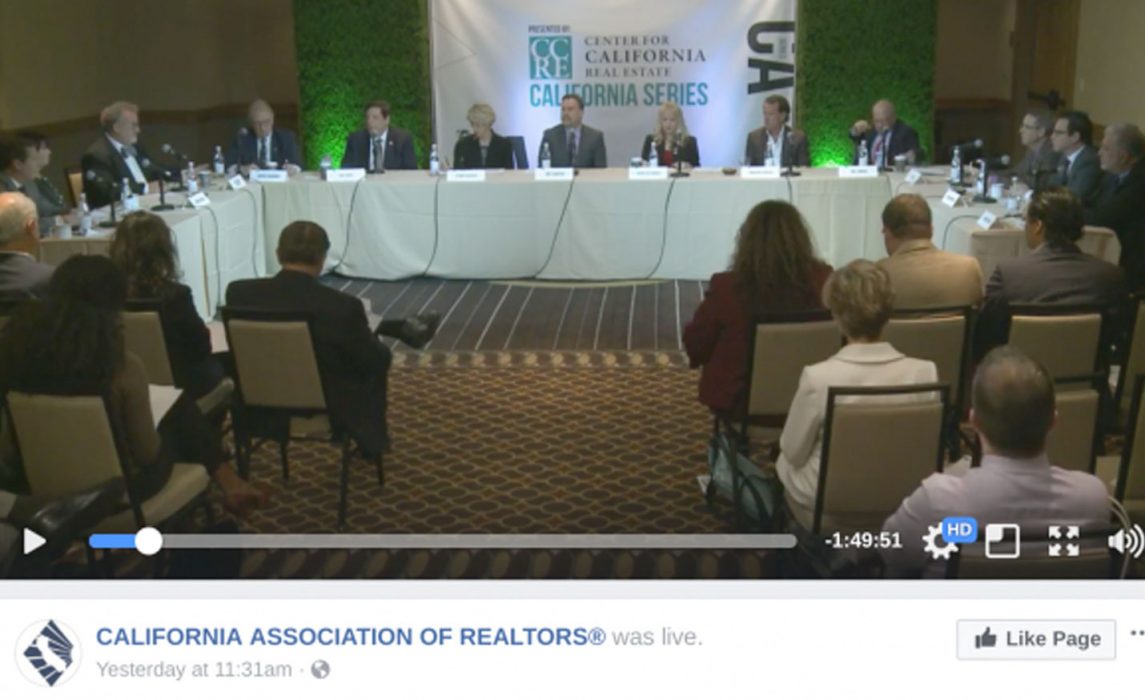
Yesterday (January 10, 2018), the California Association of REALTORS® hosted a live Facebook video panel about MLSs. The panel was filled with excellent leaders from the MLS and brokerage communities, and the discussion was robust and in-depth. Equally fascinating were all the comments rolling along below the video. (For those who use Facebook, here’s a link to the video, though I have no idea if it will work or not, because Facebook linking is weird.)
For example, one of the most common threads in the comments was from brokers and agents saying that the biggest concern with the MLS is taking the data back from Zillow, etc. Several commentators even said MLSs were rolling in the dough from having sold off the listing data to everyone. Of course, these commentators are wrong. We work with over 150 MLSs across the country from mega to tiny, and, to my knowledge, they all require the brokers’ permission to send listing data anywhere. And very little, if any, money is involved.
(Side note: This misunderstanding by brokers and agents as to how “syndication” works through the MLS has even prompted us — based on input from a customer — to re-label our syndication function to the more generic term “broker distribution” in the hopes that fewer people will misunderstand what is happening and who controls it.)
Another significant misunderstanding of “the MLS” was perpetuated by the host, Joel Singer, who kept asking the question to the effect of (not an exact wording), “Does anyone disagree that if we were to start over that one database be the best approach?” Even with Joel asking this question multiple times, no one on the panel said anything and so it seemed like everyone agreed, which I’m quite confident wasn’t actually the case.
Rebecca Jensen was quick to point out that brokers have just as many problems dealing with all the different MLS licensing agreements, fees, and requirements as they do with the different data formats, so a “single database” all by itself doesn’t solve the problem. Later in the discussion, others pointed out that new data elements (e.g., green/sustainability fields) are coming forward all the time and a few commented that a single database would make adopting quickly to such changes harder, but, again, the basic proposition put forth as a challenge by Joel was never directly questioned.
Meanwhile, I’m sitting in my office in frigid Fargo, ND, screaming at my monitor and imagining my words freezing and exploding as they crashed into the screen only to disappear with no one but me to hear them. I guess I should have commented on the Facebook thread but that was roaring on about Zillow, etc., so it all seemed pointless.
Back to the “one database” issue, I’ve written before in the context of RPR and Upstream why “one database to rule them all” is a non-starter in this web age (think links, not silos). Leaving aside that a “single database” concept ignores all the technological advancements of the last thirty years or more, it simply isn’t practical in any way (there are thousands and thousands of listing databases today, not just the 700 or so MLS databases) and, most importantly, it ignores what I think is the most fundamental purpose of the MLS: Enhancing competition through cooperation.
This last point is most important. I think the entire industry has made a mistake in defining MLS by reference to cooperation. Instead, I think the industry would be better if we declared that the goal of the MLS is to enhance competition. Without a doubt, cooperation is the means by which competition is enhanced, but more competition is the goal. This idea — coopetition — is hardly new and, in my mind, it is the true goal of the MLS industry. (This is why I think CMLS’s “Making The Market Work” campaign is so brilliant. Without directly saying the word, the focus is on helping competing brokers to create the market and markets are all about competition.)
An example of how this emphasis on competition as the goal is important is that we can avoid pitfalls like focusing on a “single database”, which would be anti-competitive, slow-moving, bad technologically, and generally impractical. Instead, we focus on standards work like RESO is doing as way to make sense of all the crazy ideas competition creates.
Our industry needs more competition at every level: brokers, agents, MLSs, Associations, technology vendors, franchises, etc., etc. Every policy and strategic decision we make as an industry should ask the simple question of whether it increases or decreases competition. Period.
P.S. This post is already too long but I need to add one more thing. Many of the comments in FB were to the effect that agents “need protection” (I presume from Zillow and others) and I can see how that’s confusing given that many Associations do form to “protect” the members. But, even if that is part of the role of the Association, it should not be the purpose of the MLS. This is just another way that the MLS is misunderstood.
P.P.S. I also need to give a shout-out to Greg Robertson for his post related to this topic, Speaking MLS.

 Michael Wurzer
Michael Wurzer